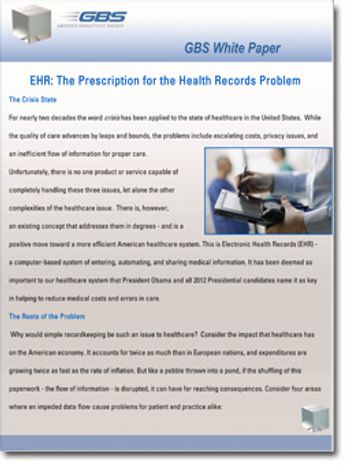
In this podcast, Dr. Jeffrey Hertzberg, president of Medformatics, Inc., a Minneapolis-based consulting firm, provides tips, hints, and advice regarding EHR usage during patient exams.

In this podcast, Dr. Jeffrey Hertzberg, president of Medformatics, Inc., a Minneapolis-based consulting firm, provides tips, hints, and advice regarding EHR usage during patient exams.

It's not just the software that makes an EHR tick; it's also the vendor behind it. Here's how to find out if you and the vendor are truly a perfect match.

Even if physicians are influenced by the incentive or social pressure to make a purchase, the real test will be what, if anything they are doing with their new EHR a couple of years down the road after the initial excitement wears off.

Perhaps it is time to consider that despite the brilliance and hard work of the pioneers, the early decisions, made when their naiveté was unavoidably most pronounced, have had the effect of defining a paradigm for EHR that is not capable of yielding the results that they envisioned.

As the person in our medical group who definitely does a significant amount of the administrative work ... I have made the leap to the fully electronic charting system early and have been using it for two months. I love it, but worry about the learning curve for our surgeons and others on the medical staff based on my experience.

The HITECH Act significantly strengthened aspects of the HIPAA Security Rule. If you are a 'Covered Entity' or 'Business Associate' it's time to get serious!

The process of finding the right EHR system isn’t always easy no matter what your background, and we even switched systems after just six months with the one I initially selected. But in the end, it was worth it.

To implement EHR nationwide, it could cost $168 billion - it boggles the mind, but where does it come from?

When your EHR fails you, don't panic. Here's how to create the best possible 'downtime' plan.

Certification is good for large, legacy companies. It anoints what they have already done thus minimizing the need to innovate in the future. It is in their interest to flex whatever political muscle they have to insure that certification is required.

Even if you previously passed on using voice recognition technology, with EHRs and the movement toward integrated healthcare, it might deserve a second look.

With government incentive dollars flowing and new tech tools like tablet computers and patient portals emerging, more practices are embracing a digital future. But for many, the old barrier to adoption - money - remains.

Physicians Practice asked its readers "What are the most crucial questions you should be asking your technology vendor?" Here are 20 of our favorites.

A new study suggests that practices wanting to let go of their paper-based ways should give local independent practice associations (IPAs), which are staffed by HIT-savvy medical pros, a chance to help.

Coding questions? We've got the answers

Patients say they want their doctors’ offices to be tech-savvy. They want to communicate with you and your staff, use patient portals and smartphone applications. But there’s a difference between wanting a digital future and actually knowing how to get there. Here’s how to get your patients and staff on board.

The feds have aggressively stepped up their fraud and abuse efforts. Your practice may play by the rules, but that doesn't guarantee it will escape federal scrutiny.

A newly released HIMSS survey, commissioned by McKesson, reveals that a large number of healthcare organizations, through the combined use of EHRs and other assessment tools, are not achieving their goal of “clinical transformation.”

Have the rules changed for CERT (Comprehensive Error Rate Testing) reviews?

Itinerant practitioners, of any sort, pose a challenge to the organizations that use them and present a challenge. They may work at several different facilities during a single week. Each facility has its own policies, procedures and data systems, all of which are notorious for being arcane and highly detailed.

As physicians embrace the EHR and the flow of information changes from the traditional physician narrative to a computer generated note, it is becoming increasingly difficult to add a narrative report to each patient note.

E-prescribing has not only improved the efficiency of this practice, it has improved quality at the same time.

The medical profession exists precisely because of ambiguity and uncertainty. If patients knew intuitively and precisely what was wrong with them or if there was a one-to-one correspondence between signs, symptoms, and specific diagnoses, the practice of medicine would be a trade, not an art.

When "slow adoption" is questioned, what is being asked is why ordinary doctors haven’t done what the superstars have done.

Our latest analysis of the annual ranking of payers based on hassle factor is here. The good news: Most insurers are paying faster, denying less, and making their processes more transparent. But there's still room for improvement.